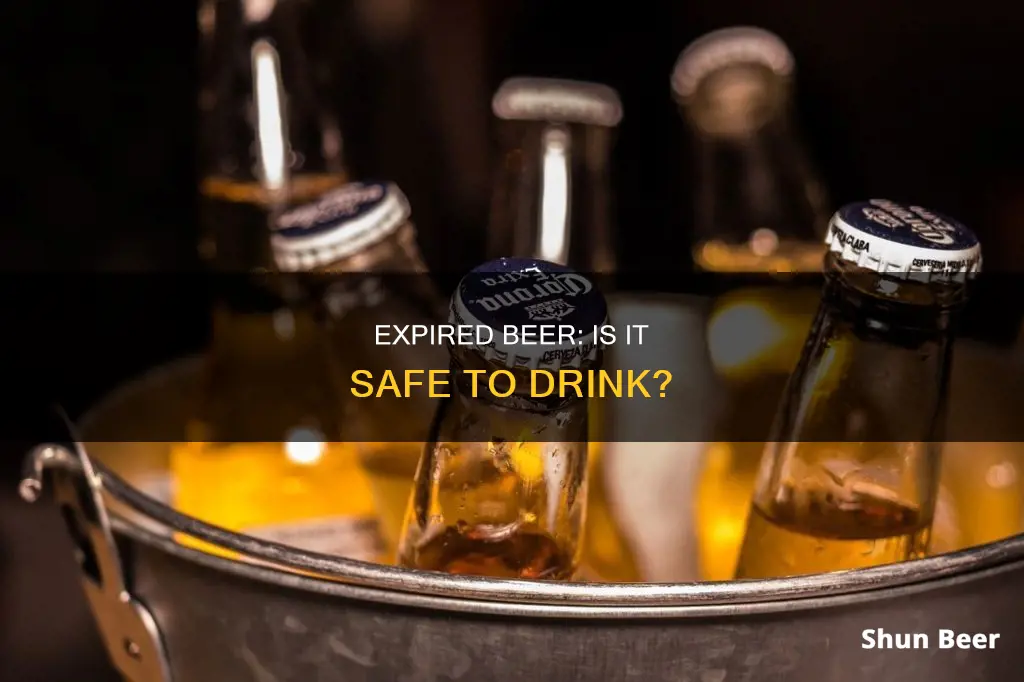
Beer has a best before date, not an expiration date. This means that drinking beer past its prime may be unpleasant, but it is unlikely to be unsafe. The fermentation process, low pH level, and alcohol content make it difficult for microorganisms to survive in beer. However, the taste of beer changes over time, and it is recommended to consume beer as fresh as possible. Factors such as oxygen, heat, and light can negatively impact the flavour of beer, causing it to become skunky or stale.
| Characteristics | Values |
|---|---|
| Is expired beer unsafe to drink? | In most cases, no. Beer has 'Best before' dates, not 'Expiration dates.' Beer changes with age, with most beers tasting worse, but this doesn't make them unsafe. |
| Is there a difference between beer tasting bad and being unsafe? | Yes. Beer has a 'Best before' date to indicate when it should be consumed by to enjoy it in a fresh state. |
| What causes beer to taste bad? | Oxygen, heat, and light. Oxygen interacts with the compounds from malt, yeast, and hops, causing oxidation and a papery taste. Heat speeds up oxidation, and light triggers a chemical reaction that produces a compound with a skunky taste. |
| How can you prevent beer from going bad? | Keep beer in a cool, dark place, preferably a refrigerator. If storing at room temperature, ensure it is out of direct sunlight. Store beer upright to minimise oxygen exposure. |
| What happens if beer is exposed to heat or sunlight? | Beer will go stale and develop a skunky taste. |
| What are the signs of expired beer? | Loss of fizz, indicating that the seal was broken. Vinegary taste, indicating bacterial contamination. |
What You'll Learn

Beer has a 'best before' date, not an expiration date
'Best before' refers to food and drink items that are unlikely to pose any danger to humans, even when they're past the date listed on the packaging. Producers use these dates to indicate when they think their product should be consumed by to be enjoyed in its freshest state.
On the other hand, 'expiration dates' are attached to food items that are likely to develop pathogens that could be dangerous or even deadly to humans. These are more common on animal-based products, such as meat, milk and eggs.
While it's rare, there are pathogens that can survive in beer and be harmful. However, these issues are usually related to grain and the brewery, rather than the age of the beer. Mould can also grow in beer, especially if the bottle was dirty at the time of packaging or if the seal is broken.
The fermentation process used in brewing beer, as well as its low pH level and alcohol content, make it an unfriendly environment for microorganisms. So, even if a beer sits on the shelf for years, as long as it's sealed, it's unlikely to make you sick.
However, over time, the taste of beer will change. Hoppy beers, like IPAs, are best consumed fresh, as the delicate hoppy aromas will begin to dissipate over time. Beers with higher ABV, such as barley wines and imperial stouts, are brewed with aging in mind and can improve with age.
Drinking Beer in Your Car: Pennsylvania's Laws
You may want to see also

Beer is unlikely to make you sick, even if it's old
Beer has a "best before" date rather than an expiration or use-by date. This is because, unlike food items with expiration dates, beer does not pose a danger to humans, even if it is old. Expiration dates are attached to food items that have a very real likelihood of developing pathogens that are dangerous or even deadly to humans, such as meat, milk, and eggs.
While beer won't make you sick, there are a couple of situations where you'll have to throw out an old bottle or can. Firstly, if your beer has lost its fizz, that's a sign that the seal was broken at some point, and the beer will be flat. Secondly, if a beer that isn't supposed to be tangy has a vinegary taste, that's an alert that bacteria have gotten in, and you'll need to toss it.
To keep your beer fresher for longer, store it in a cool, dark place, preferably a refrigerator. If you're storing at room temperature, make sure it's out of direct sunlight. Also, try to keep your beers standing upright, as this minimises their exposure to oxygen.
Liver Transplant and Alcohol: Is Drinking Beer Safe?
You may want to see also

Beer tastes worse as it gets older
The fermentation process, low pH level, and alcohol content of beer make it unfriendly to microorganisms, so it's unlikely to make you sick even if it's been sitting on the shelf for years, as long as it's sealed. However, the taste of beer changes over time, and it can develop an unpleasant flavour.
Oxygen, heat, and light are the main culprits responsible for the change in flavour. Oxygen interacts with the compounds from malt, yeast, and hops, causing oxidation and a papery taste. Heat speeds up oxidation, so it's important to store beer in a cool, dark place, preferably a refrigerator. Major changes in temperature can also affect the taste, and it can't be reversed. Lastly, light, specifically UV light, can cause the beer to become "light struck", giving it an unpleasant skunky taste.
Some types of beer are more sensitive to time than others. Hop aromas, for example, are time-sensitive, and the citrusy, floral, and tropical notes can diminish over time. On the other hand, the sweet, grainy, caramel notes of a malty beer increase with age, so heavier beers with higher ABV contents have greater longevity.
Old Beer: Is It Safe to Drink After Four Months?
You may want to see also

Beer can be unsafe to drink if it has pathogens or mould
Beer is unlikely to be unsafe to drink, even if it's expired. The fermentation process used in brewing, as well as its low pH level and alcohol content, make it difficult for microorganisms to grow. However, it's important to note that while expired beer may not pose a health risk, it can taste bad due to oxidation, heat, or light exposure.
That being said, there are rare situations where expired beer can be unsafe to consume. Beer can be contaminated with pathogens or mould, which can be harmful. Pathogens in beer are incredibly rare, but they can be introduced during grain production or in the brewery. Mould can grow in beer if the bottle is dirty or if the closure is not secure, allowing ingress. If there is visible mould in the beer, it is best to discard it.
To minimise the risk of pathogens or mould in beer, it is important to practice good hygiene and sanitation during the brewing process. Proper cleaning and sanitising of equipment are crucial to prevent the growth of harmful microorganisms. Additionally, using airtight closures and storing beer in cool, dark places can help prevent mould growth.
While the chances of encountering harmful pathogens or mould in beer are low, it is always important to inspect the beer before consumption. If it exhibits any signs of spoilage, such as an off-putting smell or visible mould, it is best to discard it. Remember, while expired beer may not be unsafe, it can still taste less pleasant than fresh beer due to the natural ageing process.
In conclusion, while beer is generally safe to drink even if it's past its expiration date, it is important to be cautious and vigilant for any signs of contamination. By practising good hygiene and sanitation during brewing and storage, the risk of encountering harmful pathogens or mould can be minimised.
Hunting and Drinking Beer: Is It Legal?
You may want to see also

Beer should be stored in a cool, dark place
Beer is best stored in a cool, dark place. This is because beer is affected by light, heat, and oxidation.
Light
Beer is often stored in dark bottles to protect the liquid inside from the sun's UV rays. Exposure to sunlight creates a chemical reaction in the beer, breaking down its flavour components until it smells and tastes like skunk spray. This is why beer that has been exposed to sunlight for too long is said to have been "skunked" or "lightstruck".
Heat
Heat speeds up oxidation, so storing beer in a refrigerator is best. Major changes in temperature, like from an ice-cold cooler to a hot car, can also negatively affect the beer.
Oxidation
Oxidation occurs when oxygen interacts with the compounds from malt, yeast, and hops. This causes oxidation and a disappointing papery taste. The longer the beer is stored, the worse it gets. Once a bottle or can of beer is opened, oxidation goes into hyperdrive.
How to Store Beer
To prevent the above from happening, beer should be stored in a cool, dark place, preferably the refrigerator. If you're storing beer at room temperature, make sure the sun can't reach it. Beer should be stored upright, as this allows for less exposure to oxygen than if the bottle or can is lying on its side.
Beer and Lithium: What's the Verdict?
You may want to see also
Frequently asked questions
Yes, drinking expired beer is generally safe. Beer has a "best before" date, not an expiration date, and even if it's been sitting on the shelf for years, it's unlikely to make you sick.
The four main factors that cause beer to spoil or "skunk" are light, oxygen, heat, and time. Hops are sensitive to UV radiation from the sun, so beer bottles are usually tinted brown to protect them. However, even a short exposure to sunlight can cause a chemical reaction that gives the beer a skunky flavour.
If your beer has lost its fizz, it's a sign that the seal was broken, and the flavour will be affected. If a beer has a vinegary taste, it's an indication that bacteria have gotten in, and it's best to throw it out.







